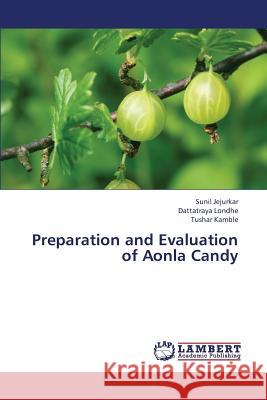Preparation and Evaluation of Aonla Candy » książka
Preparation and Evaluation of Aonla Candy
ISBN-13: 9783659450013 / Angielski / Miękka / 2013 / 60 str.
In present study, the aonla candy is prepared from the "Banaras" variety of Aonla or Indian gooseberry (Emblica Officinais Gearthn.) fruit. The pretreatment of blaching is given to the aonla by using immersion method. The aonla fruits were blanched at 100 C for 10 minutes. The easily and neat segmentation of aonla fruit is observed after 10 minutes of immersion. The blanched slices were dipped in the sugar syrup, made from equal weight of sugar as that of the aonla fruits taken for the preparation of the aonla candy. Sugar syrup concentration was changed periodically after every 24 hours by increase of 10 B (40, 50, 60, 70 B). After 60 B, the slices kept for the 72 hours at 70 B. The higher weight reduction was observed at 70 B. The prepared sample was dried by using two drying methods viz. oven drying and shade drying. Oven drying method was not suitable for proper drying of the osmosis slices, which does not, removes the sufficient amount of the moisture in prior to storage of the products. The shade drying method was observed well for candy preparation where the colour of the candied product is does not change with effective removal of the moisture content up to 35 C. In organol"
In present study, the aonla candy is prepared from the "Banaras" variety of Aonla or Indian gooseberry (Emblica Officinais Gearthn.) fruit. The pretreatment of blaching is given to the aonla by using immersion method. The aonla fruits were blanched at 100˚C for 10 minutes. The easily and neat segmentation of aonla fruit is observed after 10 minutes of immersion. The blanched slices were dipped in the sugar syrup, made from equal weight of sugar as that of the aonla fruits taken for the preparation of the aonla candy. Sugar syrup concentration was changed periodically after every 24 hours by increase of 10˚B (40, 50, 60, 70˚B). After 60˚B, the slices kept for the 72 hours at 70˚B. The higher weight reduction was observed at 70˚B. The prepared sample was dried by using two drying methods viz. oven drying and shade drying. Oven drying method was not suitable for proper drying of the osmosis slices, which does not, removes the sufficient amount of the moisture in prior to storage of the products. The shade drying method was observed well for candy preparation where the colour of the candied product is does not change with effective removal of the moisture content up to 35˚C. In organol











